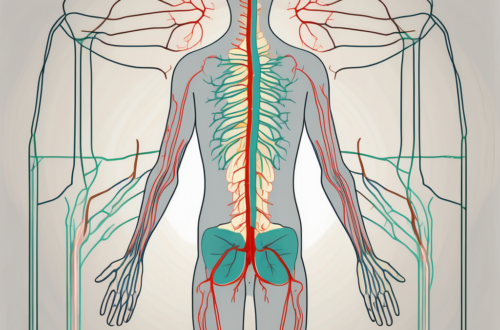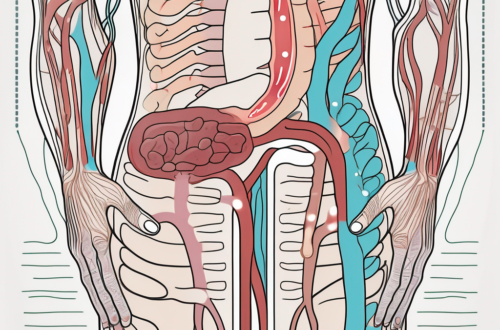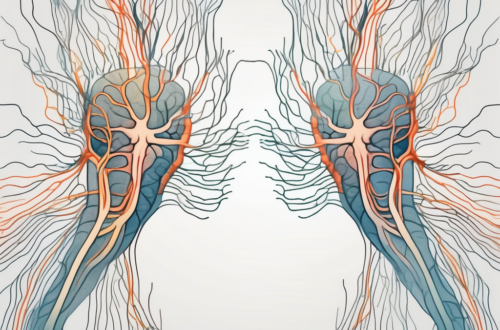The parasympathetic nervous system plays a crucial role in regulating various bodily functions. Understanding how this system operates is essential for maintaining optimal health and well-being. In this article, we will explore the mechanisms that control the parasympathetic nerve, the factors that influence its regulation, the disorders associated with its dysfunction, and the future directions in research concerning this vital component of our autonomic nervous system.
Overview of the Parasympathetic Nervous System
The parasympathetic nervous system is responsible for promoting rest, relaxation, and restoration in the body. It works in conjunction with the sympathetic nervous system, which stimulates the “fight or flight” response. While the sympathetic system prepares the body for action, the parasympathetic system helps maintain a state of equilibrium. It regulates functions such as digestion, heart rate, and respiratory rate, ensuring efficient physiological processes.
The parasympathetic nervous system is a fascinating and intricate network of nerves and ganglia that plays a vital role in maintaining our overall well-being. Let’s delve deeper into the role and function of this remarkable system.
Role and Function of the Parasympathetic Nerve
The parasympathetic nerve, also known as the “rest and digest” nerve, originates from the cranial and sacral regions of the spinal cord. It sends signals to the organs and glands, promoting digestion, conserving energy, and stimulating relaxation responses. This nerve acts as a counterbalance to the sympathetic nerve, helping to maintain proper functioning of bodily systems when not under stress or threat.
When we are in a state of rest, the parasympathetic nervous system takes over, allowing our body to focus on essential functions such as digestion. It stimulates the release of digestive enzymes, increases blood flow to the digestive organs, and promotes the absorption of nutrients. This intricate process ensures that our body efficiently breaks down food and extracts the necessary nutrients to support our overall health.
Moreover, the parasympathetic nerve plays a crucial role in conserving energy. It slows down our heart rate, reduces blood pressure, and promotes relaxation. This state of calmness allows our body to conserve energy and recharge, preparing us for the challenges of the day ahead.
Key Components of the Parasympathetic Nervous System
The parasympathetic nervous system consists of various components that work in harmony to regulate physiological processes. These include the vagus nerve, cranial nerves, and specialized ganglia.
The vagus nerve, the longest cranial nerve, plays a prominent role in transmitting signals to the heart, lungs, gastrointestinal tract, and other vital organs. It acts as a communication highway, relaying information between the brain and the targeted organs. This intricate network ensures that the parasympathetic system can effectively regulate and control various bodily functions.
Specialized ganglia, connected by synapses, allow for the transmission of information between different parts of the parasympathetic nervous system. These ganglia act as relay stations, ensuring that signals are efficiently transmitted and received. Through this intricate network, the parasympathetic system can maintain a delicate balance within the body, promoting optimal functioning of various physiological processes.
In conclusion, the parasympathetic nervous system is a remarkable system that promotes rest, relaxation, and restoration in the body. It works hand in hand with the sympathetic nervous system, ensuring that our body can respond appropriately to different situations. The parasympathetic nerve, along with its key components, plays a vital role in maintaining our overall well-being. Understanding the intricacies of this system allows us to appreciate the complex mechanisms that keep our body functioning harmoniously.
The Science Behind Nerve Regulation
Understanding the science behind how the parasympathetic nerve is regulated provides valuable insights into maintaining its optimal functioning. Several mechanisms play a role in nerve regulation, ensuring the balance and efficiency of the parasympathetic nervous system.
Mechanisms of Parasympathetic Nerve Regulation
One primary mechanism involved in parasympathetic nerve regulation is negative feedback loops. When the body detects an excess or deficiency of certain physiological factors, such as oxygen or nutrients, it triggers responses that involve the parasympathetic system to restore equilibrium. This intricate feedback system ensures that the parasympathetic nervous system responds appropriately to maintain homeostasis.
Another crucial mechanism of parasympathetic nerve regulation is the release of specific neurotransmitters, such as acetylcholine. These neurotransmitters act as chemical messengers, facilitating communication between nerve cells. Acetylcholine, in particular, plays a vital role in regulating nerve activity and transmitting signals between nerve endings. When acetylcholine binds to its specific receptors, it triggers a cascade of events that regulate various bodily functions.
Furthermore, the parasympathetic nervous system is regulated by the autonomic nervous system, which consists of two branches: the sympathetic and parasympathetic systems. While the sympathetic system prepares the body for fight-or-flight responses, the parasympathetic system promotes rest and relaxation. The balance between these two systems is crucial for maintaining overall health and well-being.
Neurotransmitters and Their Impact on Nerve Regulation
Neurotransmitters are chemical messengers that facilitate communication between nerve cells. In the parasympathetic nervous system, acetylcholine is the primary neurotransmitter responsible for transmitting signals across synapses. It binds to specific receptors, triggering a cascade of events that regulate various bodily functions.
Understanding the impact of neurotransmitters on nerve regulation allows researchers to develop targeted interventions and treatments for conditions that affect parasympathetic nerve function. For example, certain medications can modulate the release or uptake of neurotransmitters, helping to restore balance in individuals with parasympathetic dysfunction.
Moreover, recent research has shown that lifestyle factors, such as diet and exercise, can influence parasympathetic nerve regulation. Regular physical activity has been found to enhance parasympathetic tone, promoting relaxation and reducing stress. Similarly, a nutrient-rich diet, particularly one high in omega-3 fatty acids and antioxidants, can support optimal nerve function and regulation.
In conclusion, the science behind nerve regulation is a complex and fascinating field of study. Negative feedback loops, neurotransmitters, and the balance between the sympathetic and parasympathetic systems all contribute to the regulation of the parasympathetic nerve. Understanding these mechanisms and their impact on nerve regulation opens up possibilities for targeted interventions and lifestyle modifications to promote optimal parasympathetic functioning.
Factors Influencing Parasympathetic Nerve Regulation
While the parasympathetic nervous system is a highly efficient self-regulating system, several external and internal factors can influence its regulation and functioning. Awareness of these factors helps us better understand the complexity of maintaining a healthy parasympathetic system.
The parasympathetic nervous system, often referred to as the “rest and digest” system, plays a crucial role in maintaining homeostasis within the body. It works in opposition to the sympathetic nervous system, which is responsible for the “fight or flight” response. By regulating various bodily functions, such as heart rate, digestion, and relaxation, the parasympathetic nervous system ensures our overall well-being.
Impact of Stress on the Parasympathetic Nerve
Stress has a profound impact on the regulation of the parasympathetic nerve. When faced with chronic stress, the sympathetic nervous system dominates, often suppressing the parasympathetic system. This imbalance can lead to various health issues, including digestive disorders, cardiovascular problems, and impaired immune function. Managing stress through relaxation techniques and seeking support when needed is vital to support parasympathetic nerve function.
Chronic stress not only affects the parasympathetic nervous system but also has detrimental effects on our overall well-being. It can disrupt the delicate balance between the sympathetic and parasympathetic systems, leading to a cascade of negative consequences. From increased blood pressure to compromised immune function, chronic stress takes a toll on our bodies. Therefore, it is essential to prioritize stress management techniques, such as meditation, deep breathing exercises, and engaging in activities that bring joy and relaxation.
Age and Parasympathetic Nerve Function
As we age, our parasympathetic nerve function may naturally decline. This decline can contribute to symptoms such as decreased cognitive function, impaired digestion, and reduced cardiovascular fitness. However, it’s important to note that individual variations exist, and not everyone will experience the same degree of decline. Maintaining a healthy lifestyle, including regular physical activity and a balanced diet, can help support parasympathetic nerve function as we age.
While aging is an inevitable part of life, it does not mean that we have to accept a decline in parasympathetic nerve function without taking action. Engaging in regular exercise, such as walking, swimming, or yoga, can help stimulate the parasympathetic nervous system and improve its functioning. Additionally, adopting a diet rich in fruits, vegetables, and whole grains provides essential nutrients that support the health of our nerves and overall well-being.
Furthermore, cognitive exercises, such as puzzles, reading, and learning new skills, can help maintain cognitive function and support the parasympathetic nervous system. By challenging our brains and staying mentally active, we can promote the health of our nerves and delay the onset of age-related decline.
Disorders Related to Parasympathetic Nerve Regulation
Disorders affecting the regulation of the parasympathetic nerve can significantly impact overall health and well-being. Recognizing the symptoms, seeking a proper diagnosis, and exploring treatment options are crucial steps in managing these conditions effectively.
The parasympathetic nervous system, often referred to as the “rest and digest” system, plays a vital role in maintaining homeostasis in the body. When this system is disrupted, it can lead to a variety of disorders that affect different aspects of our health.
Symptoms and Diagnosis of Parasympathetic Nerve Disorders
Parasympathetic nerve disorders can present with a wide range of symptoms, including digestive issues, dizziness, blurred vision, dry mouth, and excessive sweating. These symptoms can be distressing and significantly impact an individual’s quality of life.
Diagnosis often involves a thorough medical history, physical examination, and potentially specialized tests to assess nerve function. Healthcare professionals may use techniques such as autonomic function tests, which measure the body’s response to specific stimuli, to evaluate the functioning of the parasympathetic nervous system. It is important to consult with a healthcare professional for proper diagnosis and to rule out other potential underlying causes of these symptoms.
Furthermore, it is worth noting that parasympathetic nerve disorders can sometimes be challenging to diagnose due to the overlap of symptoms with other conditions. Therefore, healthcare professionals may need to conduct a comprehensive evaluation to accurately identify the underlying cause.
Treatment and Management of Parasympathetic Nerve Disorders
The treatment and management of parasympathetic nerve disorders depend on the underlying cause and specific symptoms experienced. It is essential to address the root cause of the disorder to effectively manage the symptoms and improve overall well-being.
Lifestyle modifications can play a significant role in supporting parasympathetic nerve function. Stress management techniques, such as meditation, deep breathing exercises, and yoga, can help reduce the body’s stress response and promote relaxation. Additionally, dietary adjustments, such as consuming a balanced diet rich in fruits, vegetables, and whole grains, can provide essential nutrients to support nerve health.
In some cases, medication or targeted therapies may be prescribed to address specific symptoms. For example, medications that promote saliva production may be prescribed to alleviate dry mouth, while medications that regulate heart rate and blood pressure may be used to manage cardiovascular symptoms associated with parasympathetic nerve disorders.
It is important to work closely with healthcare professionals to develop an individualized treatment plan based on the diagnosis and individual needs. Regular follow-ups and open communication with healthcare providers are essential to monitor progress and make any necessary adjustments to the treatment plan.
Overall, while disorders related to parasympathetic nerve regulation can be challenging to manage, with the right diagnosis, treatment, and support, individuals can effectively alleviate symptoms and improve their overall well-being.
Future Directions in Parasympathetic Nerve Research
Continued research in the field of parasympathetic nerve regulation holds great promise for our understanding of its complexities and potential implications for medical treatments. Emerging techniques and advancements offer exciting opportunities for further exploration into this vital aspect of our autonomic nervous system.
Emerging Techniques in Nerve Regulation Study
Advances in imaging technology, such as functional magnetic resonance imaging (fMRI) and positron emission tomography (PET), allow researchers to visualize and study the functioning of the parasympathetic nervous system in greater detail. These techniques provide insights into the activity of the nerve pathways and the impact of various interventions on nerve regulation. Continued research using these cutting-edge techniques will further enhance our understanding of parasympathetic nerve regulation.
Furthermore, recent developments in neuroimaging have enabled researchers to investigate the intricate connections between the parasympathetic nervous system and other parts of the brain. By mapping out these neural networks, scientists can gain a deeper understanding of how the parasympathetic nerve interacts with different regions of the brain, shedding light on its role in emotional processing, cognitive functions, and overall mental well-being.
Potential Implications for Medical Treatments
As our understanding of the parasympathetic nervous system and its regulation expands, the potential for developing innovative medical treatments increases. Targeted interventions aimed at modulating parasympathetic nerve activity could have applications in treating a range of conditions, including gastrointestinal disorders, cardiovascular diseases, and mental health conditions.
For instance, recent studies have shown that stimulating the parasympathetic nerve through non-invasive techniques, such as transcutaneous vagus nerve stimulation, can have therapeutic effects on conditions like depression, anxiety, and chronic pain. These findings open up new possibilities for non-pharmacological interventions that can complement or even replace traditional treatment approaches.
However, it is important to note that more research is needed to determine the safety and efficacy of such treatments before they become widely available. Rigorous clinical trials and long-term studies are necessary to evaluate the potential risks and benefits associated with modulating parasympathetic nerve activity.
In conclusion, understanding the regulation of the parasympathetic nerve is essential for maintaining optimal health and well-being. From its role in rest and relaxation to the underlying mechanisms and factors influencing its regulation, this complex system plays a vital role in maintaining physiological equilibrium.
By recognizing the symptoms and seeking appropriate diagnosis and treatment for parasympathetic nerve disorders, individuals can take proactive steps to support their overall health. Moreover, healthcare professionals can utilize this knowledge to develop personalized treatment plans that target the specific dysfunctions within the parasympathetic nervous system.
Furthermore, ongoing research in this field offers promising avenues for future medical advancements that could potentially benefit countless individuals. With continued exploration into the intricate workings of the parasympathetic nerve, we can unlock new insights into its regulation, paving the way for innovative therapies and interventions that improve the lives of patients worldwide.





